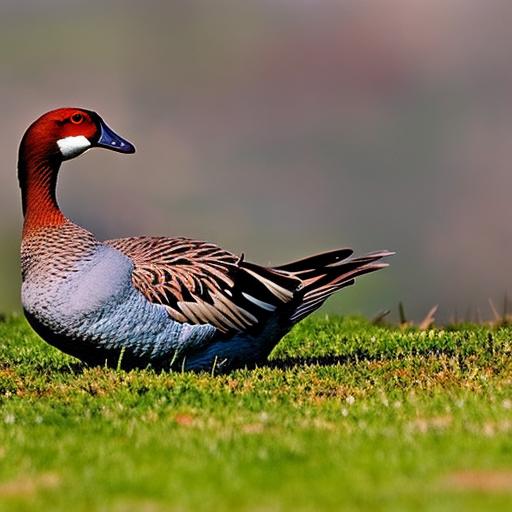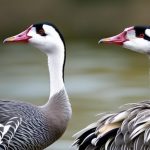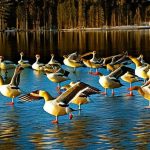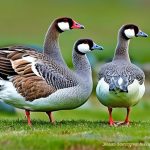Geese are attracted to lawns for a variety of reasons, and understanding these reasons is crucial in finding effective solutions to keep them away. One of the main reasons geese are drawn to lawns is the abundance of food. Lawns often provide easy access to grass, clover, and other vegetation that geese feed on. Additionally, lawns near bodies of water, such as ponds or lakes, are particularly attractive to geese as they provide a source of water and a safe place for them to rest. Geese are also attracted to open spaces where they can easily spot potential predators and have a clear view of their surroundings. Furthermore, lawns that are well-maintained and free of obstacles are appealing to geese as they provide ample space for grazing and resting.
Another reason geese are attracted to lawns is the lack of natural predators in urban and suburban areas. Without natural predators to keep their numbers in check, geese populations can quickly grow and become a nuisance to homeowners. Additionally, geese are social animals and are often drawn to areas where other geese have been spotted. This means that once a few geese have found your lawn to be a suitable habitat, more are likely to follow. Understanding these reasons can help homeowners develop a comprehensive approach to keeping geese away from their lawns.
Key Takeaways
- Geese are attracted to lawns due to the availability of food, water, and open space for nesting and resting.
- Planting tall grasses, shrubs, and trees can create an unattractive environment for geese, as they prefer open spaces with clear sightlines.
- Installing fences, hedges, or other physical barriers can effectively prevent geese from accessing your lawn.
- Using noise-making devices such as propane cannons or visual scare tactics like reflective tape can deter geese from entering your lawn.
- Chemical repellents like methyl anthranilate or natural repellents like garlic or chili pepper can discourage geese from staying on your lawn.
Natural deterrents: Using plants and landscaping to discourage geese from entering your lawn
Using plants and landscaping strategically can be an effective way to discourage geese from entering your lawn. One approach is to plant tall grasses and shrubs around the perimeter of your lawn. These plants can create a physical barrier that makes it difficult for geese to access the lawn, as they prefer open spaces where they can easily spot potential predators. Additionally, tall grasses and shrubs can provide nesting sites for other birds of prey, which may deter geese from entering the area.
Another natural deterrent is to incorporate plants that are unappealing to geese into your landscaping. Geese are known to avoid certain types of plants, such as those with thorns or prickly leaves. By including these plants in your landscaping, you can create an environment that is less attractive to geese. Additionally, incorporating native plants into your landscaping can help create a habitat that is more appealing to other wildlife, which may compete with geese for resources.
Physical barriers: Installing fencing or other physical barriers to prevent geese from accessing your lawn
Installing physical barriers such as fencing can be an effective way to prevent geese from accessing your lawn. Fences can create a clear boundary that deters geese from entering the area. When installing a fence, it’s important to make sure that it is tall enough to prevent geese from flying over it, as they are capable of flying at heights of up to 8,000 feet. Additionally, fences should be installed close to the ground to prevent geese from squeezing underneath them.
Another physical barrier that can be effective in keeping geese away is a barrier of fishing line or monofilament line. This type of barrier is nearly invisible and can be strung around the perimeter of the lawn at a height of about 2 feet. When geese attempt to cross the barrier, they will encounter the resistance of the line and be deterred from entering the area. It’s important to regularly inspect and maintain this type of barrier to ensure its effectiveness.
Sound and visual deterrents: Utilizing noise-making devices and visual scare tactics to keep geese away
Utilizing noise-making devices and visual scare tactics can be an effective way to keep geese away from your lawn. One option is to use noise-making devices such as propane cannons or electronic sound emitters. These devices emit loud noises at regular intervals, which can startle and deter geese from entering the area. It’s important to vary the timing and location of these devices to prevent geese from becoming accustomed to the noise.
Visual scare tactics can also be effective in keeping geese away from your lawn. One common visual scare tactic is the use of decoy predators, such as plastic coyotes or owls. These decoys can create the illusion of a potential threat to geese, causing them to avoid the area. It’s important to regularly move these decoys around the lawn to prevent geese from becoming accustomed to their presence.
Repellents: Using chemical or natural repellents to discourage geese from entering your lawn
Using chemical or natural repellents can be an effective way to discourage geese from entering your lawn. One option is to use chemical repellents that are designed specifically for deterring geese. These repellents are typically applied to the grass and create an unpleasant taste or smell that deters geese from feeding on the lawn. It’s important to follow the manufacturer’s instructions when using chemical repellents and to reapply them as directed for continued effectiveness.
Natural repellents can also be effective in keeping geese away from your lawn. One natural repellent option is the use of grape seed extract, which creates a bitter taste that deters geese from feeding on the grass. Another natural option is the use of garlic or chili pepper spray, which can create an unpleasant smell that deters geese from entering the area. It’s important to regularly reapply natural repellents, especially after rainfall, to ensure their continued effectiveness.
Consistent maintenance: Implementing regular maintenance practices to make your lawn less attractive to geese
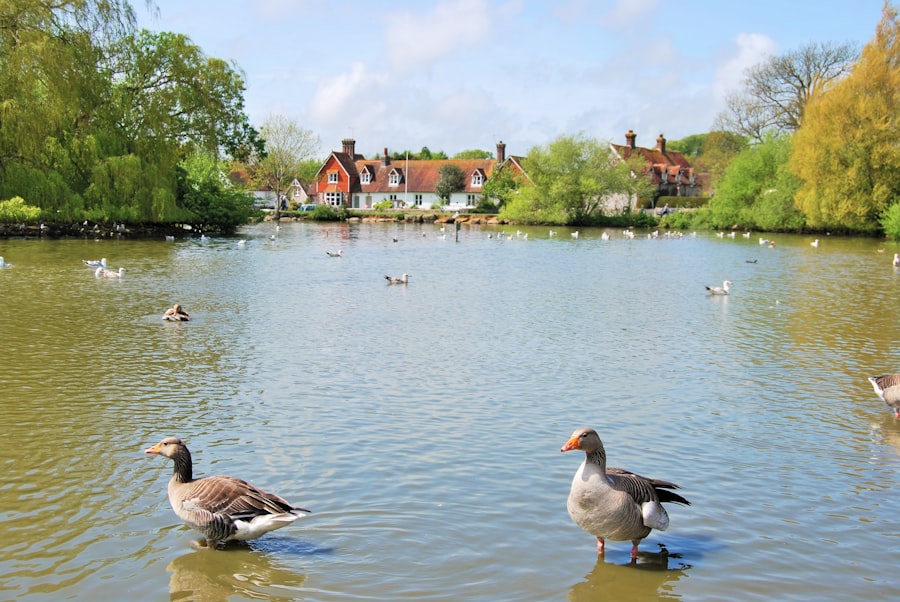
Implementing regular maintenance practices can help make your lawn less attractive to geese. One important maintenance practice is to keep the grass on your lawn mowed at a height of about 3 inches. Shorter grass makes it more difficult for geese to feed on and can make the area less appealing to them. Additionally, removing excess thatch and debris from the lawn can help reduce the availability of food sources for geese.
Another maintenance practice is to limit the use of fertilizers on your lawn. Fertilizers can promote the growth of lush, green grass that is particularly attractive to geese. By using fertilizers sparingly and following recommended application rates, you can help make your lawn less appealing to geese. Additionally, removing any standing water or sources of water on your lawn can help make the area less attractive to geese, as they rely on water sources for drinking and bathing.
Seeking professional help: Consulting with wildlife experts or pest control professionals for effective and humane solutions
If you’re struggling with persistent goose problems on your lawn, it may be beneficial to seek professional help from wildlife experts or pest control professionals. These professionals can provide valuable insight into effective and humane solutions for keeping geese away from your lawn. Wildlife experts can offer advice on habitat modification and other non-lethal methods for deterring geese, while pest control professionals can provide information on chemical repellents and other control methods.
Additionally, wildlife experts and pest control professionals can help you navigate any legal considerations associated with managing goose populations. In some areas, certain control methods may be regulated or prohibited, so it’s important to consult with professionals who are knowledgeable about local laws and regulations. By seeking professional help, you can gain access to expertise and resources that can help you effectively address goose problems on your lawn while ensuring the humane treatment of these animals.
In conclusion, keeping geese away from your lawn requires a comprehensive approach that addresses the reasons why they are attracted to the area. By utilizing natural deterrents, physical barriers, sound and visual deterrents, repellents, consistent maintenance practices, and seeking professional help when needed, homeowners can effectively manage goose problems while promoting a healthy and balanced ecosystem in their outdoor spaces.
Looking for effective ways to keep geese off your lawn? Check out this insightful article on PoultryWizard that provides practical tips and strategies for managing geese and other poultry in your outdoor space. Whether it’s using natural deterrents, creating physical barriers, or implementing humane repellents, this article offers valuable advice to help you maintain a goose-free lawn.
FAQs
What are some effective methods for keeping geese off the lawn?
Some effective methods for keeping geese off the lawn include using visual deterrents such as scarecrows or reflective tape, using physical barriers like fences or netting, and using repellents such as goose repellent sprays or granules.
Are there any natural ways to keep geese off the lawn?
Yes, there are natural ways to keep geese off the lawn. Planting tall grasses or shrubs around the perimeter of the lawn can create a natural barrier that deters geese from entering. Additionally, using natural repellents such as predator urine or citrus-based sprays can also help keep geese away.
What should I do if geese have already made a home on my lawn?
If geese have already made a home on your lawn, it is important to first consult local wildlife authorities to determine the best course of action. In some cases, it may be necessary to seek professional assistance to safely and humanely relocate the geese.
Are there any legal restrictions on how to keep geese off the lawn?
There may be legal restrictions on how to keep geese off the lawn, as geese are protected under various wildlife conservation laws in many regions. It is important to research and understand the local regulations before implementing any methods to deter geese from your lawn.
How can I prevent geese from returning to my lawn in the future?
To prevent geese from returning to your lawn in the future, it is important to consistently use a combination of deterrent methods such as visual deterrents, physical barriers, and repellents. Additionally, maintaining a clean and unattractive environment for geese by removing food sources and keeping the lawn well-maintained can help discourage their return.
Meet Walter, the feathered-friend fanatic of Florida! Nestled in the sunshine state, Walter struts through life with his feathered companions, clucking his way to happiness. With a coop that’s fancier than a five-star hotel, he’s the Don Juan of the chicken world. When he’s not teaching his hens to do the cha-cha, you’ll find him in a heated debate with his prized rooster, Sir Clucks-a-Lot. Walter’s poultry passion is no yolk; he’s the sunny-side-up guy you never knew you needed in your flock of friends!

